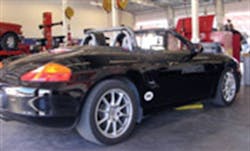Are custom wheel sales slowing down? It depends on where you are, the kind of wheels you sell and who else is selling them
Independent tire dealers know that selling custom wheels can be a lucrative niche if you possess the expertise to market them and the knowledge and equipment to mount them properly.
And if you're one of those dealers who's worried about the competition selling them, results of Modern Tire Dealer's 2007 Custom Wheel Survey reveal a trend that might be of interest: namely, fewer independent tire dealers seem to be selling aftermarket wheels.
Sixty-three percent of respondents to this year's survey report that they sell custom wheels. That's a 13% drop from five years ago.
Talking with dealers, it appears that custom wheel sales trends vary according to region and wheel type.
On the East Coast, Gene Cunningham, owner of Belford Tire Center Inc. in Union, N.J., says his custom wheel sales in general aren't what they once were. "I haven't had anybody ask about custom wheels in six to eight months," he says. "I used to cut (wheel manufacturer) American Racing a check for $3,000 each month; it's gone from that to zero."
The state of the local economy bears some of the blame, according to Cunningham. "In order to buy wheels, you need bucks."
[PAGEBREAK]
On a bigger scale, he says the proliferation of Internet custom wheel vendors has substantially cut into his wheel business. "A lot of times people will order their wheels from The Tire Rack. Or people go to (a wheel manufacturer's) site to look at them."
Wishy-washy buyers only contribute to the frustration, he adds. "You get a kid pulling in with his Acura and I'll spend an hour with him showing him wheels, and he'll say, 'I'll let you know,' and then he'll leave!"
Tim Glidewell, manager of Allen's Tire & Custom Wheels in Jacksonville, Texas, reports that his passenger wheel sales have fallen off a bit. "Every now and then I'll sell some."
However, his store is still selling more custom wheels for truck and SUV applications than ever before. (Common sizes include 18 and 20 inches.)
John McGill, owner of Valley Tire & Brake of Santa Rosa (Calif.), a single-location dealership one hour north of San Francisco, says he's selling fewer wheels. Up until the early part of the decade, McGill stocked lots of wheels and even wholesaled some to other outlets.
"There were fewer options for wheels back them," he recalls. "Then in the early 2000s, the mail order (operations) took a big chunk of that business.
"We went from being in a position of buying lots of wheels and keeping a large inventory... it's an expensive proposition, to finding it's easier to order per sale as opposed to stocking wheels."
Other factors have led to a decrease in McGill's wheel sales. "OE cars are coming with more customized wheels on them."
Even road conditions in and around Santa Rosa have had an effect, he notes. "The road conditions in our area are shoddy at best. You have people with 17- and 18-inch wheels who are running into problems of bending (their rims)" due to the poor terrain.
Todd Wood, manager of Coy's Custom Wheel & Tire in Denver, Colo., says his dealership is selling fewer wheels than last year. "I attribute that to Internet sales and increased competition."
A growing number of customers are shopping for wheels on the Internet, which cuts into his revenue. As for local competition, he says one of Denver's main drag, Federal Boulevard, "had six or seven tire/wheel stores on it; now it's one every three blocks." Despite this, Wood says established, knowledgeable dealerships will continue to hold the upper hand over newer, fly-by-night operators.
[PAGEBREAK]
"Our society (promotes) a fast-food style of life. People want the hamburger in 30 seconds and they also want it fresh. Customers come in with money burning in their pockets and they want it now.
"A lot of people come here because they know we're the spot for wheels. And it's the talent of your salespeople that motivate customers to accept what you have."
Buyer trends
Modern Tire Dealer's 2007 Custom Wheel Survey also highlights trends pertaining to custom wheel buyers.
First, wheel buyers seem to be skewing younger. Respondents to the 2007 survey said the age group that purchases the most wheels is the 16 to 24 group at 43%. Coming in second (36%) are ages 25 to 34. Ages 35 to 49 make up 15%, while ages 50 and older make up 6%.
Five years ago, 25- to 34-year-olds were the dominant group -- though just barely -- at 33%. Closing in at 32% were 16- to 24-year-olds. Ages 35 to 49 made up 26%. The rest were customers 50 years or more in age.
For the most part, what custom wheel buyers are looking for hasn't changed, but the value they place on each criterion seems to have shifted.
In 2007, 70% of survey respondents said styling is "extremely important" to customers versus 52% in 2002. However, price has become more of a factor; 53% of respondents this year said price was "extremely important," up 11% from five years ago.
And in a trend that's good news for dealers, respondents to the 2007 questionnaire said more customers (27%) rely upon dealer recommendations in their selection of custom wheels than five years ago (21%).
However, there appears to have been little change in gender demographics over the last five years. In 2007, males comprise 83% of custom wheel buyers versus 84% during 2002.
